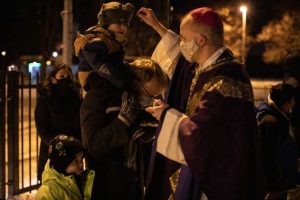Words on the Word
Ash Wednesday
Joel 2:12-18: Between vestibule and altar let the priests lament.
2 Corinthians 5:20-6:2: Now is the day of salvation.
Matthew 6:1-6, 16-18: Your Father who sees in secret will reward you.
The backdrop to our reading from Joel is a national crisis. In the prophecy’s first chapter we encounter images of warriors, consuming fire, the rumble of chariots, a quaking earth and a trembling sky. The text is two and a half thousand years old, more or less. But the scene it describes could be drawn from the television news.
How do we respond to brutal aggression? That is the question which challenges Europe now, face to face with the war in Ukraine. It is a question we’ve trouble answering. We hear of sanctions, strategic aid, aid programmes for refugees. All this is necessary. From a Christian point of view, however, more is called for – a great deal more.
What does Joel exclaim to his own times ravaged by war? ‘Be converted! Let your hearts be broken!’ War is the outward expression of a kind of violence – a ‘No!’ to God’s summons – which we all carry within us. The path to peace goes through my own heart. I must acknowledge the unpeace I have brought, and keep bringing, into the world.
We all leave our mark on the whole, at a microscopic level, but effectively. We have spent the past two years living with a symbol of what this might mean. We know what havoc a tiny virus can wreak on a global scale. The insight cannot be metaphorised away: we carry responsibility for one another.
The first stage of responsibility is to settle accounts with ourselves. We should take this task seriously in Lent. But that is not the end of responsibility. We also have, all of us, the chance to assume some part of the burden others carry. Joel cries out: ‘Between the vestibule and the altar let the priests, the ministers of the Lord, lament. Let them say, Spare your people, Lord!’ Every year this text stirs me profoundly. Before God, we can be ambassadors for one another. The pain and anguish another carries is mine to bring before God’s merciful throne. Through us God’s mercy can reach others, even where they’re not prepared to grant it access of their own accord.
This is the mystery of intercession – which in fact is not mysterious at all. The moment you recognise the Church as a body, it is evident that what goes on in one limb has an effect on other limbs. To intercede is to practise a kind of reflexology. In so far as I utterly surrender myself into God’s hands, comfort can be felt in some other part of the body. This is a source of hope. It reminds us that we are never powerless before the suffering of another. In Christ we can carry it before our Father, who knows how to pardon and heal.
Naturally, we do not remain untouched. To pray is to show compassion. Compassion is not practised in the abstract. It presupposes vulnerability. It presupposes my willingness to be hurt. To turn towards God ‘with an undivided heart’ is risky. We must open up our bricked-up hiding places. We must give grace access everywhere. This may hurt, but it is deeply freeing.
Little by little we learn how to live lives marked by the victorious seal of the Cross. St Paul’s notion of ‘the day of salvation’ ceases to be something alien and excessively devout. It becomes the foundation for life here and now. We make an adult choice to experience what it means to live in Christ, prepared to know both the darkness of Calvary and the transfiguring light of Easter Day.
In a few moments, the cross of Jesus will be marked with ashes on our foreheads. It is a powerful confession. By receiving the ashes, we testify that our Christian pilgrimage goes through the burn-out of death and that there, in what is lifeless, the empowering, joy-bearing power of Christ is made manifest. Nothing in us is so dead that it cannot be resurrected if Christ’s light is allowed to shine upon it. There is no conflict within us or about us that cannot be resolved if we let ourselves be reconciled. As we have seen: It is in our power, in Christ’s name, to carrying reconciliation into others’ deep-seated strife.
Lets’ then take the word of Scripture seriously. Let us do what is asked of us: ‘Let your hearts be broken! Turn around!’ There is still time. We must make use of it. The Lord waits for us to act. He calls on us, to us, expectantly.

Ash Wednesday in Trondheim last year when, on account of restrictions, we had to celebrate Mass outside. Photo: Adresseavisen.
